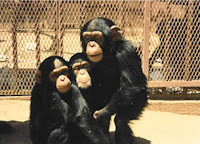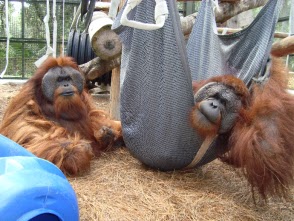Marion Pellicano Ambrose
Some of you will scan the title and say," I don't need to read this", but I hope you WILL read it all the way through. Every human being needs to know what is happening each and every day; just to "entertain" us and get our dollars!
The TRUTH about Apes in Entertainment
Great apes are sentient animals who have the same emotions (positive and negative) as humans - compassion, affection, jealousy, anger, generosity, embarrassment, sense of humor, joy, homesickness, and sadness. In all the animal kingdom, they are the closest to man in behavior and intelligence, but they are not pseudo-humans or clowns for our pleasure.
In spite of the public's increased sensitivity and awareness of animal protection issues, chimpanzees and orangutans are still used today to perform in live stage shows at tourist attractions, television productions, movies, circuses, print ads, studio work for commercials, mall openings, casino appearances, state fairs, and late night talk shows.
The truth is that great apes used in these situations are only babies or juveniles. Infant apes are used because adolescent and adult orangutans and chimpanzees are too strong and unmanageable, and therefore too dangerous to work around the public or around actors on sets.
 |
| BamBam starred in a soap opera. |
At this very young age, chimpanzees and orangutans can be cute, endearing, sometimes funny, and the public loves them. They star in award-winning ads. When they appear in these advertisements, they make money for the company selling their product, as well as for the advertising agency, the ad production crew, the trainers, the actors, and everyone connected with the ad... but not for the apes themselves.
Using great apes in advertising and entertainment may be successful for the trainer, the studio, or the advertising agency, but it usually means a life of misery and uncertainty for the apes.
Apes used in the entertainment business are taken away from their mothers when only weeks or months old, to be raised by humans and taught unnatural behaviors and tricks. But, they only have a working "shelf- life" of six to eight years. Since chimpanzees can live in captivity for over 60 years, where do they go after their working career is over at age eight, and still a juvenile?
 |
| Sammy was in a popular movie. |
The sad fact is that for decades these famous simian actors who made us laugh have ended up as experimental subjects in biomedical research... or in deplorable and shabby roadside zoos... or in tiny backyard cages... or in breeder compounds where their own babies were pulled from them to repeat the whole process of working young apes for entertainment.
Today more ex-entertainment apes are finding their way into legitimate sanctuaries where they can live with their own species in enriched environments with good nutrition and without exploitation. But the nine or ten great ape sanctuaries in North America are all currently at or over capacity. And, since the trainers and owners of these apes rarely (if ever) provide any funding to the sanctuaries to take their apes off their hands, the sanctuaries take the entire responsibility of providing the financial care for these former entertainers for the next 50 years after their retirement from show business.
 |
| Bella in CareerBuilders ad |
In an age where processes like animatronics and digital animation allows filmmakers and TV producers to create animal likenesses on computers... and where computer animated movies like "Happy Feet" and "King Kong" were box office successes, there is no need to ruin the lives of chimpanzees and orangutans for their entertainment value.
Sanctuaries work to protect these orangutans and chimpanzees and provide a future for them. But the next and most important need is for the public - i.e. you - to object to the use of apes in entertainment and to let the "users" (movie producers, ad agencies, TV studios) know that this is no longer acceptable to an enlightened generation!
In Memory of…
Since people working apes don't want unproductive adolescent chimpanzees (especially young macho males) they look for other places to send them. And when cute baby pet chimpanzees who have lived in human homes become too large to be handled safely by their owners, they need a home quickly.
Accredited zoos rarely accept these human-raised apes, and it is difficult to find a place suited to meet their needs. So, many of these discarded apes have been sent into unsuitable facilities with inexperienced staff. Some of these scenarios recently have resulted in tragedy.
· Just a few years ago several ex-pet adolescents and adults were sent to a private ranch owner (with no chimpanzee experience) who wanted to get into the breeding business. Within months of their arrival, three of the chimpanzees died.
· Another female who produced eight babies for a renowned Hollywood trainer was separated from her mate and companions at the entertainment compound (where she had lived for twenty years) and ended up in a drive-through safari park where she died only a month after her arrival.
· Two adolescent male chimpanzees that appeared with many famous actors and actresses in their early years, but were sent to a private family's compound when they grew too strong to perform, made the news several years ago when they escaped from their backyard cage and attacked a man severely. Both young males were shot and killed.
 |
| Tyler |
· Tyler, another chimpanzee actor who starred in the movie Race to Space with James Woods about the NASA chimps, was "out-placed" from an entertainment compound along with his brother when they also grew too big to work in show business. They were sent to a small unaccredited zoo in Royal, Nebraska where they lived for only a year or two in tiny cages. When Tyler and his three chimpanzee companions at the roadside zoo found themselves in a cage that the keeper had left unlocked, they took flight... but they did not attack anyone. Eleven-year-old Tyler was still shot and killed as were two of his companions who had once been pets in people's homes. When his brother saw Tyler die, he ran back to the unlocked cage and closed himself inside. His brother, Ripley, has since been sent to another unaccredited zoo.
 |
| Buddy, Tyler, Ollie, & Ripley during their working years as infants and before they were "out-placed" from entertainment. Buddy was 16 when he was shot and killed, and Tyler was only 11. |
How can we allow this to continue?
What can you do to help?
1. BE COUNTED! Object to the use of apes in entertainment and let the "users" (movie producers, ad agencies, TV studios) know that this is no longer acceptable to an enlightened generation!
2. Support ACCREDITED sanctuaries like the Center For Great Apes by contributing, volunteering, sending items from their wish list (http://www.centerforgreatapes.org/wish-list.aspx ),
or adopting one of the residents.
3. Support legislation to ban the use of these noble animals in labs and unaccredited zoos.
4. Contact the Center for Great Apes and learn more.
Information and photos for this post came directly form the website of the Center for Great Apes. DRL salutes the men and women who give their time, talent and treasure for the benefit of these amazing animals. We hope you will join us by supporting their efforts. Special thanks to Tina GIlbert-Schenck, a dedicated and courageous woman who I greatly admire. DRL is grateful for her support and help in spreading awareness and appreciation of the Great Apes!

Thank you for sharing Marion. What an awful way for them to live, then die. I am so glad you found the Center for Great Apes and I am now a proud adopted parent of Pebbles. I think of the tragedy last night of 48 animals having to be killed because of an uncaring and a criminal care taker. These animals do not ask to be put into the situations and it is so sad they are abused and neglected!
ReplyDeleteI'm glad I did read this all the way through. How can people do these things? I have never realized what happened to these apes after the movies. I assumed they retired to a nice, comfortable reserve and never knew they were kept in garages and cages. Thank God there are places like your center for apes! I think I will adopt an ape and ask friends to do the same. Thank you for posting this.
ReplyDelete